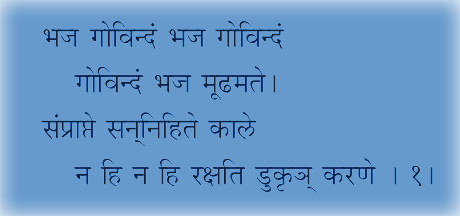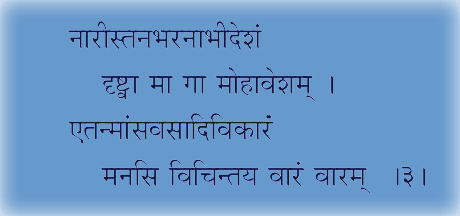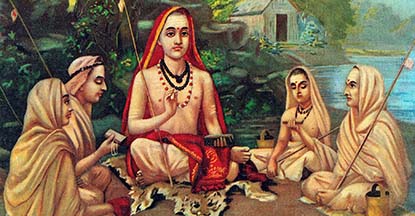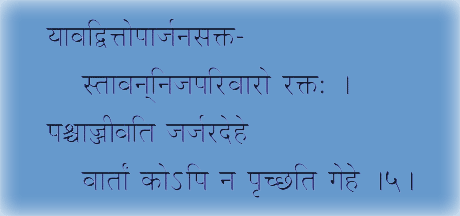
Translation
Worship the Spirit, worship the Spirit, worship the Spirit, O Fool! For grammar rules (material pursuits) will not protect you when the appointed time arrives.
Interpretation
This verse is the chorus of the Bhaja Govindam. Here Shankara exhorts us to look beyond the material trappings of the world. The reference to grammar-rules is made because Shankara observed a pundit, scholar, in Benaras memorizing the rules of Sanskrit grammar without understanding the message of the scriptures written in Sanskrit. Following the letter but not the spirit. From this he draws a lesson that is relevant to all of us. We often travel the road of life without so much as thinking about what we are doing. Without questioning. We get lost in the frills of life while missing out on its very essence.
‘Bhaja Govindam’ or ‘Worship the Spirit’ is repeated thrice because Shankara is asking us to align our three equipments – the body, mind and intellect towards the higher. A diagram of our composition is shown below:
The body is the equipment through which perceptions are taken in and actions are performed. The mind is the seat of emotion and feeling while the intellect is the domain of discrimination and judgment. By repeating the words ‘Bhaja Govindam’ thrice, Shankara urges us to seek and worship Govinda, the Self within, in everything we do. When we enjoy sense contact, we can either indulge in the enjoyment or focus on the divine Power that facilitates the enjoyment. Similarly, actions can be performed with a selfish end in mind or dedicated to a higher cause, the highest being Self Realization. With the mind, we must cultivate a devotional attitude rather than bind ourselves with attachments. There must be an awareness of the unseen Force that has blessed us all so generously. Finally, with the intellect we must use our power of discrimination to distinguish between the permanent and the temporary in our lives. In essence, every thought, feeling, perception and action must be directed towards our goal of Self-realization or self-development.
Shankara asks us to seek the Self because the lasting happiness that we seek does not lie out there in the world but within each one of us. No amount of worldly knowledge, referred to by Shankara as grammar-rules, gives us sustainable joy. True happiness comes when we are able to rise above our little selves and our egos to a higher level of awareness.
When the ‘appointed time’, death, stares us in the face, the only things we are able to carry forward with us are our spiritual assets. We are unable to take the wealth we worked so hard to accumulate, the relationships we developed or the ‘grammar rules’, worldly knowledge, we have assimilated through the course of our lives. Therefore Shankara asks us to invest in ourselves, not only to build healthy bank balances but to create spiritual assets that we can carry forward with us.
This does not mean we have to stop what we are doing and give it all up. What Shankara means is that wherever we are, whatever we are doing, the focus must be on improving ourselves, controlling our desires and moving towards the ultimate goal of Self-realization. Utilising our talents to improve ourselves.
Shankara refers to us as moodha (fools). He calls us foolish for focusing on the transient, temporary aspects of life while completely missing out on the permanent factor, Govinda, the Self in our lives. We indulge in the world and its trivialities at the cost of self-development. In our short-sightedness we choose the trappings of immediate pleasure over long-term satisfaction. We choose junk food instead of healthy food, quick divorces over lasting relationships…
Thus Shankara is merely asking us to wake up to our own potential that is Infinite.
In a dark room it is pointless just re-adjusting the furniture. What we need is just a little light. Then navigating the room becomes easy. Similarly in the passage of life we are only trying to reorganize the world. Instead we need to bring in the light of knowledge to make our sojourn a pleasant one.
‘Govinda’ is a name of Krishna but is not to be taken in the narrow sense. Krishna means the Spirit in us all. That which is dark, unknown. Atman (the Self) is unknown to us.
Govinda’ comes from the root ‘go’ which has a few interpretations. These are given below:
Earth: The substratum of the earth is Atman.
Cattle: Krishna was a cowherd who drove the cattle to the pastures at sunrise and brought them back to their sheds at sundown. Similarly we drive our senses to their respective pastures of sense objects every day. Atman enables the senses to enjoy the sense contact.
Speech: Speech is an organ of action and represents all organs of action. Atman empowers the organs to act.
The Vedas: The very subject of the Vedas is Atman. The message of the Vedas is Tat Tvam Asi, You are that, the infinite, all pervading, all powerful Self.



